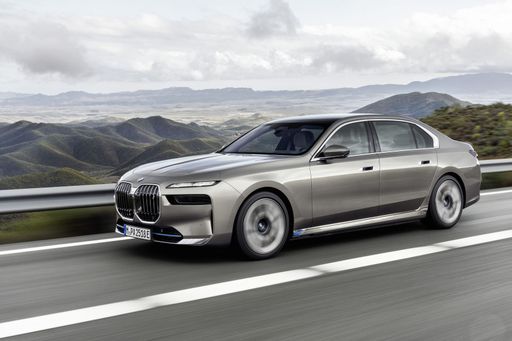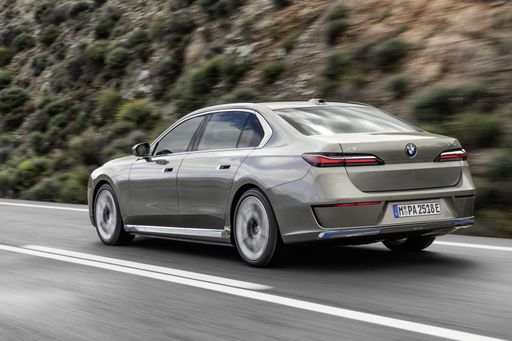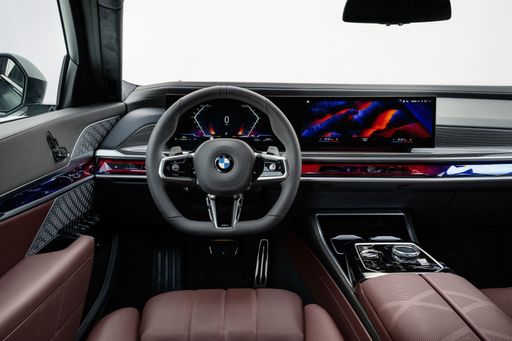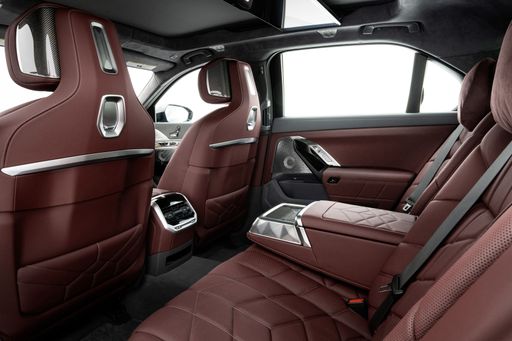BMW i7 VS Renault Master Bus
BMW i7
The new BMW i7 epitomises luxury and innovation, seamlessly blending advanced technology with elegant design. Its interior offers an unparalleled experience, with premium materials and cutting-edge features that create a tranquil yet engaging atmosphere for both driver and passengers. The i7's performance is both dynamic and efficient, demonstrating BMW's commitment to sustainable driving without compromising on the exhilarating drive the brand is known for.
more informationRenault Master Bus
The Renault Master Bus offers a spacious and flexible interior, making it an excellent choice for transporting groups comfortably. It features a robust design and advanced safety systems, ensuring a secure ride for all passengers. With its efficient diesel engine, the Master Bus combines power with impressive fuel economy, appealing to both businesses and private users alike.
more information @ press.bmwgroup.com
@ press.bmwgroup.com
 @ press.bmwgroup.com
@ press.bmwgroup.com
 @ press.bmwgroup.com
@ press.bmwgroup.com
 @ press.bmwgroup.com
@ press.bmwgroup.com
Costs and Consumption |
|
|---|---|
|
Price
about 99200 - 155800
£
|
Price
about 36600 - 43200
£
|
|
Consumption L/100km
-
|
Consumption L/100km
8.7 - 10.7
L
|
|
Consumption kWh/100km
18.5 - 20.8
kWh
|
Consumption kWh/100km
-
|
|
Electric Range
559 - 623
km
|
Electric Range
-
|
|
Battery Capacity
101.7
kWh
|
Battery Capacity
-
|
|
co2
0
g/km
|
co2
227 - 280
g/km
|
|
Fuel tank capacity
-
|
Fuel tank capacity
105
L
|
Dimensions and Body |
|
|
Body Type
Sedan
|
Body Type
Bus
|
|
Seats
5
|
Seats
6 - 9
|
|
Doors
4
|
Doors
4
|
|
Curb weight
2595 - 2770
kg
|
Curb weight
2189 - 2361
kg
|
|
Trunk capacity
500
L
|
Trunk capacity
-
|
|
Length
5391
mm
|
Length
5075 - 5575
mm
|
|
Width
1950
mm
|
Width
2070
mm
|
|
Height
1544
mm
|
Height
2290 - 2486
mm
|
|
Payload
480 - 535
kg
|
Payload
939 - 1254
kg
|
Engine and Performance |
|
|
Engine Type
Electric
|
Engine Type
Diesel
|
|
Transmission
Automatic
|
Transmission
Manuel, Automatic
|
|
Transmission Detail
Reduction Gearbox
|
Transmission Detail
Manual Gearbox, Automated Manual
|
|
Drive Type
Rear-Wheel Drive, All-Wheel Drive
|
Drive Type
Front-Wheel Drive
|
|
Power HP
455 - 660
HP
|
Power HP
135 - 180
HP
|
|
Acceleration 0-100km/h
3.7 - 5.5
s
|
Acceleration 0-100km/h
-
|
|
Max Speed
205 - 250
km/h
|
Max Speed
150 - 165
km/h
|
|
Torque
650 - 1100
Nm
|
Torque
360 - 400
Nm
|
|
Number of Cylinders
-
|
Number of Cylinders
4
|
|
Power kW
335 - 485
kW
|
Power kW
99 - 132
kW
|
|
Engine capacity
-
|
Engine capacity
2299
cm3
|
|
Top speed
205 - 250
km/h
|
Top speed
150 - 165
km/h
|
General |
|
|
Model Year
2022 - 2023
|
Model Year
2023
|
|
CO2 Efficiency Class
A
|
CO2 Efficiency Class
G
|
|
Brand
BMW
|
Brand
Renault
|
BMW i7
The Pinnacle of Electric Luxury: BMW i7
Introducing the BMW i7, the latest in electric innovation from one of the world's premier automobile manufacturers. Blending cutting-edge technology with luxurious comfort, the i7 represents a significant leap forward in the electric vehicle (EV) market. This article delves into the technical specifications and innovative features that set the BMW i7 apart from its competitors.
Powerful Electric Performance
Under the sleek exterior of the BMW i7 lies a powerhouse of electric capabilities. Depending on the model configuration, the i7 offers between 455 and 660 PS, with a torque of up to 1100 Nm. This ensures an exhilarating driving experience, whether you choose the rear-wheel drive or all-wheel drive configuration. The acceleration is equally impressive, with the i7 capable of going from 0 to 100 km/h in just 3.7 to 5.5 seconds.
Efficient Energy Consumption
The efficiency of the BMW i7 is noteworthy, with an energy consumption ranging from 18.5 to 20.8 kWh/100 km. This efficiency, combined with a substantial battery capacity of 101.7 kWh, gives the i7 an electric range of between 559 and 623 kilometres. BMW’s commitment to sustainability is further underscored by its zero CO2 emissions, reinforcing its status as a premium yet environmentally conscious choice.
Sophisticated Interior and Technology
Inside, the BMW i7 is the epitome of luxury. With seating for five, the interior exudes elegance and comfort. Advanced technology is at your fingertips with features such as the latest iDrive system, providing seamless connectivity and enhanced control over vehicle functions. The i7 ensures you travel in style with its sophisticated Design Pure Excellence, M Sport package, and M Sport package Pro interior trims.
Dimensions and Capacity
The i7’s ample dimensions – with a length of 5391 mm, width of 1950 mm, and height of 1544 mm – are matched by its generous luggage capacity of 500 litres, ensuring practicality alongside luxury. The car's robust build is complemented by a payload capacity of between 480 to 535 kg, ensuring the i7 is as functional as it is stylish.
Cost and Efficiency
With prices ranging from €115,700 to €181,800, the i7 is positioned as a high-end vehicle offering value through its advanced features and performance. The monthly operating costs range between €2,143 and €3,027, while the cost per kilometre is approximately 85.7 to 121.1 cents. Despite its upscale market positioning, the i7 offers competitive efficiency with its remarkable CO2 emission-free driving and energy-saving technologies.
Conclusion
The BMW i7 stands as a testament to the brand’s innovation and dedication to sustainable luxury. By marrying performance, efficiency, and cutting-edge technology, BMW has ensured that the i7 not only meets but exceeds the expectations of discerning EV enthusiasts. The i7 is not merely a car; it is a statement of intent in the future of sustainable luxury. Experience the future today with the BMW i7.
Renault Master Bus
Discovering the Renault Master Bus: A Versatile Journey Ahead
Renault's Master Bus is a testament to the brand's commitment to delivering versatile and robust vehicles that cater to a variety of needs. Whether for business or personal use, the Renault Master Bus stands out with its combination of performance, space, and innovation. Join us as we delve into the technical details and pioneering features that define this remarkable vehicle.
Under the Hood: Power Meets Efficiency
The heart of the Renault Master Bus is its diesel engines, offering a choice between manual and automatic transmissions. With a power range of 135 to 180 PS, the Master Bus ensures robust performance for both city driving and long-distance travel. The engine provides remarkable torque between 360 to 400 Nm, enhancing the driving experience with smooth acceleration and power delivery across various terrains.
Fuel efficiency is a crucial consideration for large vehicles, and the Master Bus doesn't disappoint, offering fuel consumption figures ranging from 8.7 to 10.7 L/100km. The front-wheel-drive system not only aids in reducing fuel consumption but also provides stability and traction, especially in challenging driving conditions.
Spacious Design and Comfort
Space is undoubtedly one of the highlights of the Renault Master Bus. With configurations that accommodate between 6 to 9 seats, the vehicle is designed to cater to a wide array of passenger or cargo needs. Dimensions range between 5075 to 5575 mm in length, 2070 mm in width, and 2290 to 2486 mm in height, providing ample room for comfort and utility.
The bus ensures a smooth ride, with an emphasis on passenger comfort and safety, making it ideal for long journeys. Whether for work commutes or family outings, the Master Bus's design caters to everyone’s needs.
Innovation and Safety Features
Renault continues to push boundaries by integrating advanced technology and safety features into the Master Bus. Features designed to assist drivers include state-of-the-art navigation and connectivity systems, ensuring that drivers remain informed and passengers remain connected throughout their journey.
Safety is also paramount, with multiple airbags and advanced braking systems in place, offering peace of mind on every trip. The Master Bus is equipped to handle the demands of modern travel, delivering reliability and security in equal measure.
Conclusion: The Complete Package
The Renault Master Bus is a masterclass in efficiency, comfort, and innovation. Its blend of powerful performance, spacious interiors, and cutting-edge technology makes it a standout choice for those in need of a versatile transportation solution. Whether for business or leisure, the Master Bus promises a journey that's not just about getting from point A to point B, but enjoying the ride along the way.
Renault continues to drive forward with its commitment to innovation and quality, and the Master Bus stands as a proud testament to this ethos, ready to take on the roads with assurance and style.
